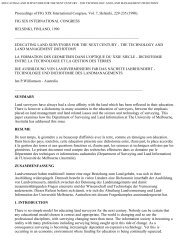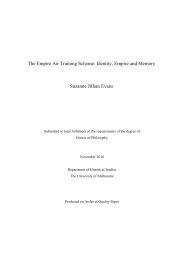Speculum - University of Melbourne
Speculum - University of Melbourne
Speculum - University of Melbourne
You also want an ePaper? Increase the reach of your titles
YUMPU automatically turns print PDFs into web optimized ePapers that Google loves.
psychological, physiological and anthropological research through, for instance, electroencephalography,<br />
which has already given us so much information <strong>of</strong> brain functioning;<br />
through the improvement in technique in what is called psycho-surgery; through the personalit)/<br />
studies postulated by Sheldon, as now being actively pursued at the Warneford Hospital,<br />
Oxford; and the pharmacological studies <strong>of</strong> Elkes in Birmingham. These are all spheres<br />
in which the clinician and the research worker must be in the closest harmony.<br />
While there are many specialists who may be attracted into the essentially scientific<br />
aspects <strong>of</strong> research, there are many others who find their satisfaction in working clinically<br />
in some particular field. I might mention, for instance, psychiatry in relation to eugenics—<br />
a grossly neglected subject, but one which is fundamental. I know there are those who<br />
blatantly exclaim, "Heredity is bunk"; but those <strong>of</strong> us who have experience, who see family<br />
groups involved seriously from generation to generation, or who have been impressed by the<br />
significance <strong>of</strong> similar twin studies, or <strong>of</strong> the spread <strong>of</strong> various form <strong>of</strong> mental deficiency or<br />
<strong>of</strong> conditions characterized by organic brain disease—for example, Huntington's chorea—<br />
cannot take such a facile attitude. It is dangerous to accept all such states as a fort <strong>of</strong> fait<br />
accompli, but rather must we do everything that is possible to improve the quality <strong>of</strong> the<br />
race. All this work has its place in our mental hospitals and colonies for mental deficiency.<br />
which should be live places for clinical research, and not merely custodial institutions.<br />
These hospitals require improvement and modernization both in equipment and in medical<br />
and' nursing personnel. They are grossly overcrowded, the ward units are much too<br />
large, but even with all their defects they constitute important organizations which call for<br />
the highest degree <strong>of</strong> administrative and medical skill. It is intensely disappointing today to<br />
note that the highest positions in the mental hospital service, posts carrying with them so<br />
much responsibility and which were so greatly prized, seem to have lost much <strong>of</strong> their former<br />
appeal and attract comparatively few candidates I believe that the main reason for this<br />
unfortunate state is because at that time <strong>of</strong> the introduction <strong>of</strong> the Mental Hospital Act the<br />
special conditions in relation to mental hospital work did not receive sufficient consideration.<br />
OTHER FIELDS<br />
If, however, your inclination lies in some other direction, then I might <strong>of</strong>fer you child<br />
psychiatry, a subject which is calling out for more workers. Here we see team-work in<br />
action. The psychiatrist, the psychologist, and the social worker pool their resources not<br />
only in an effort to deal effectively with the child and the conditions surrounding it, but also<br />
because the child is much more likely to react to satisfactory treatment than the adult. Childhood,<br />
it has been said, is the golden period for mental hygiene; it is the plastic period <strong>of</strong><br />
development, the time when prophylactic work is likely to prove fruitful. Indeed, the vast<br />
majority <strong>of</strong> the problems <strong>of</strong> childhood can be dealt with admirably by a modification <strong>of</strong><br />
environment and social circumstances and by dealing with the particular problem at a conscious<br />
level. But again we need the full co-operation <strong>of</strong> parents, school-masters and all<br />
organizations dealing with children. Our aim in all such work is to produce a state <strong>of</strong><br />
emotional and social security, which is the greatest safeguard for all subsequent disorder <strong>of</strong><br />
health and conduct.<br />
Then there is a great need to improve our relationship to the law, to the Church, and<br />
to industry. Each one <strong>of</strong> these fields is teeming with problems <strong>of</strong> great significance and<br />
importance which would require separate consideration, and which I cannot attempt to deal<br />
with here. I feel, however, that I must mention them, because psychiatry has a Feat contribution<br />
to make to each <strong>of</strong> them. And then when one has accumulated one's experience you<br />
may feel that your duty and your inclination is to spread the gospel <strong>of</strong> mental hygiene so<br />
as to educate the public to take more realistic and more humanistic attitudes towards a subject<br />
which is vitally concerned with human betterment.<br />
These, then, are some <strong>of</strong> the reasons which have led me to ask the question: Why or<br />
why not Psychiatry? I trust many <strong>of</strong> you may answer it affirmatively and that those <strong>of</strong> you<br />
who do will find in it work which will prove <strong>of</strong> infinite value to you personally, and to those<br />
whom you may be privileged to help.<br />
32

















